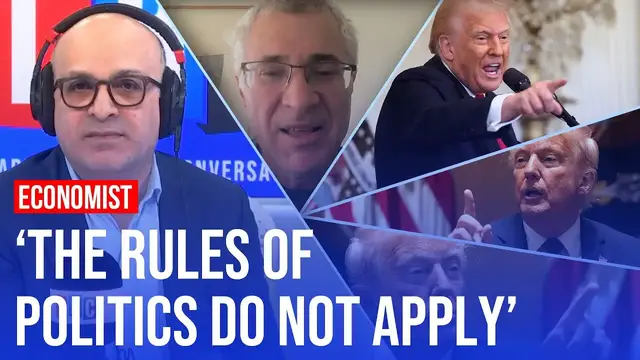0:00
Joining me to discuss this is Jonathan Portis, Professor of Economics and Public Policy at King's College London
0:06
Thank you very much indeed for joining me, Professor Portis. Is it time for us to play hardball with the US? Canada is
0:12
And apparently Mark Carney and Donald Trump had a very warm conversation the other day
0:18
Well, I think Canada is in a somewhat different position. This is existential for them. It's not about tariffs
0:24
Trump has stated that he wants to annex Canada one way or another
0:29
So there is no alternative for the Canadian prime minister to say that this is frankly outrageous and that it's intolerable
0:38
And and to do that, we are in a somewhat different position
0:43
The U.S. is not going to threaten to annex us or at least not yet anyway
0:48
You never know. But I don't think it's a matter of playing hardball
0:53
Remember, tariffs are lose-lose. The tariffs that the U.S. will impose on the rest of the world are already damaging the U.S. economy, in fact
1:04
And you've seen a very significant fall in business confidence in the stock market in the U.S
1:08
because everyone knows that what Trump is doing is not driven by economics
1:13
It's driven by his entirely bizarre personal obsessions. so if he imposes tariffs on us and other countries that will damage the u.s and it will damage us
1:25
but if we retaliate with tariffs that will damage our economy too it will as you say
1:30
push up inflation and so on so i think you know the prime minister obviously is right when he
1:36
says you should reply and respond to the national interest that means neither appeasement but nor
1:41
does it mean that playing hardball in the sense of deliberately raising tariffs across the board
1:48
which would frankly do significantly more damage to the UK economy than it would do to the US economy
1:53
The government will have to be quite careful quite measured probably try and coordinate at least to some extent with our European partners and be very careful I mean the basic point here of course is that Trump is not acting in a way that is rational either by certainly by not by economic standards but not even by any sort of conventional political standards either
2:18
And that means that the sort of conventional rules don't apply. You just have to try and avoid as much damage as possible
2:25
What do you make of what Jao Vele Almeida, former EU ambassador to the US and the UK and author of a new book
2:32
The Divorce of Nations, has said when he said if it looks like a duck and quacks like a duck
2:37
then it probably is a duck. If the tariffs threat look and sound like coercion, they probably are
2:42
coercion. And if that is the case, no one should be surprised that the EU reacts accordingly using
2:47
its anti-coercion toolbox. It's very regrettable, but that's where President Trump's attitude is
2:52
leading us. Unfortunately, if the US is going to play, if the EU is rather going to play hardball
2:56
with the US. Why shouldn't we? Well, we are a lot smaller than the EU is one important point
3:03
So I think there is certainly a case for us coordinating carefully, albeit probably via
3:10
back channels rather than openly with the EU in terms of whatever measures that we take
3:17
But what I mean, we have to look and say, what would playing hardball mean in this context
3:23
What exactly are we proposing? I certainly don't think we should be appeasing Trump
3:29
That is certainly is not the way to to protect the UK's interests
3:34
But what actually would playing hardball mean? Do we really think that imposing across the board tariffs on US goods and services or US goods would be beneficial to the UK economy or that it wouldn't do more damage to the UK economy than it would do to the US
3:52
So we do have to be quite careful about this. I think what the Formula Commissioner is saying
3:59
makes perfect sense from the EU's point of view, but the UK has to be quite careful about how we play this
4:05
Remember, Brexit gives us a bit more flexibility and wiggle room here
4:10
but it also means we considerably smaller and weaker in economic terms in terms of dealing with the US than we were before Brexit when we were part of the EU So should we be cosying up to Europe as a strategy when it comes
4:25
to how to deal with Donald Trump on tariffs? Is part of the answer to be cautious and not engage
4:32
in a tit-for-tat escalatory trade war, but actually look to now remove those trade barriers
4:38
those frictions to trade with the EU to try and cozy up to our biggest trading partner to give us
4:44
more leverage in an increasingly hostile international world. I think the short answer
4:49
to that is yes, whether or not you use the word cozy up. But look, it was a very strong case for
4:54
improving our economic and trading relationship with the EU, even before Trump was elected
5:00
because obviously Brexit has done some significant economic damage to that and repairing it should
5:05
always have been a priority for the government. But Trump obviously makes that case far, far
5:11
stronger. Since we know that whether or not we have tariffs in the short term, whether or not we
5:17
manage to do some sort of short term deal with Trump, that Trump is utterly unreliable that he
5:24
breaks promises at the stroke of a pen, and that we cannot rely on the US for our security and
5:35
economic relationship the way we have done for, frankly, most of the past century. We simply can't
5:41
And therefore, the imperative to have an arrangement with the EU that is cooperative
5:47
both in economic and security terms, and enables us to be at least somewhat more resilient to what
5:53
the US is doing, is very strong indeed. What do you make of the boss of Ineos Automotive
6:01
Lynn Calder. It's based in Germany, but obviously it's owned by Sir Jim Ratcliffe
6:07
who lives abroad but is British by background, who said that the EU has really brought this
6:13
on themselves. I mean, effectively, she was saying, I'm hugely frustrated. It's just the basics. At the
6:18
beginning of the year before Trump had even been inaugurated all of these conversations were already being had Where there is inequity which is what we have here when it comes to automotive tariffs you can address it It basic business principles Wherever there
6:31
a gap, there is a basic negotiation to be had. This was coming down the track and the EU and
6:36
indeed the UK have basically been negligent by ignoring it. Well, obviously, both the EU and the
6:44
UK could have done things better in both in economic terms and in terms of trade negotiations
6:50
for much of the last 10 years. Neither side exactly covered themselves
6:53
with glory during Brexit, did they? So fine, criticise the UK and the EU
6:59
But let's be serious. Trump came to office and the first thing he did
7:05
was impose 25% tariffs on Canada and Mexico, two countries with which he himself
7:13
had negotiated and signed the US-Canada, the US-Mexico-Canada trade agreement just in 2017
7:22
In other words, he made a deal in 2017. He came in and he tore up a trade deal with the US's closest trading partners
7:32
And in the case of Canada, of course, its closest ally and culturally most next door neighbor
7:38
So the idea that you could somehow negotiate, the fault here is the EU for not negotiating rationally with Trump is just utter fantasy
7:50
And frankly, it's just an absolutely idiotic thing for anyone who is remotely, who's had their, you know, been awake for the last two months to say, I mean, really be serious
8:03
As I say, that doesn't mean you can't criticise the UK and the EU on lots and lots of things relating to economy and trade, but suggesting that they should have anticipated what Trump was going to do and somehow averted it is sheer fantasy
8:16
Thank you very much indeed. That's Professor Jonathan Portis, Professor of Economics and Public Policy at King's College London there, giving his view on how the UK should respond to a potential terrorist being imposed by the US on the UK and the EU



